Follow Euronews' live blog on Sunday as world leaders, executives and top ministers continue with a key security conference in Munich.
Europe stands at a crossroads at this year’s Munich Security Conference, facing a perfect storm as a rapidly shifting global order threatens the EU's long-standing vision of the world.
The conference has seen landmark speeches from Ukraine’s President Volodymyr Zelenskyy and the new US administration's Vice President JD Vance — whose blistering criticism of European countries left world leaders in the room silent.
Join us for the summit's third and final day with across digital platforms and on TV, including this liveblog.
Our expert correspondents will be reporting live from the conference floor and behind the scenes, offering in-depth analysis of the key moments and discussions shaping Europe's future.

 ${title}
${title}
Live ended
 That's a wrap!
That's a wrap!
Thank you for following our coverage on the Munich Security Conference over the last few days.
We hope you will follow our upcoming coverage on key developments on the war in Ukraine and Europe's involvement in the negotiations.
Here are seven key quotes to know from several days of standout speeches:
Munich Security Conference: Here are the 7 quotes you need to remember
The annual three-day gathering in the Bavarian city saw a whole host of leaders offer, at times, competing visions of the world. #EuropeNews
How can Europe boost its defence capabilities? Here's what industry chiefs told us
Europe’s defence industry is ready to ramp up production to secure the Old Continent but it needs governments to be faster and smarter with procurement practices to address potential shortages issues, top executives at Kongsberg told Euronews.
“We are not the limiting factor in producing air defence systems,” Eirik Lie, President of Kongsberg Defence & Aerospace AS, told Euronews in an interview on the sidelines of the Munich Security Conference.
“We can produce two NASAMS batteries per month so that’s not the problem," he added.
“I think it’s a matter on the contracting side, it’s a matter of speeding up the procurement side,” Lie said, urging governments to simplify the acquisition process, aggregate procurements so orders don’t drip through slowly, and give companies “long-term visibility”.
Europe also needs to build resilient supply chains and boost innovation, particularly in AI.
Read the full story below:
Industry chiefs on what Europe needs to ramp up defence production
Industry chiefs on what Europe needs to ramp up defence production #EuropeNews
How is Europe reacting?
Calls for Europe to "step up" have dominated this year's conference, largely on the back of speeches made by US officials insisting the continent should be more responsible for its own security, and that the US would not be prepared to step in.
European leaders have scrambled to show ways in which the continent is indeed stepping up, although several more concrete measures have been floated. They include:
- European Commission President Ursula von der Leyen has demanded a plan to trigger an emergency clause giving governments greater leeway to increase defence spending. The plan would allow several member states to inject money into defence without being bound to tightly controlled budget deficit limits.
- German Chancellor Olaf Scholz predicted that Germany's next government would create an exception for defence spending in the country's constitutionally enshrined debt brake. The favourite to win next week's election, Friedrich Merz, is typically more supportive than Scholz of the debt brake, although he too has signalled that defence spending could be an exception.
- European officials are set to meet on Paris on Monday in an emergency meeting on the war in Ukraine, France's Foreign Minister Jean-Noel Barrot has confirmed.
'Réunion de travail' : French Foreign Minister confirms meeting on Monday
France's Foreign affairs minister Jean-Noël Barrot confirmed reports on France Inter this morning that there would be a meeting of European leaders on Monday in Paris over Ukraine.
British Prime Minister Keri Starmer, NATO Secretary- General Mark Rutte, and French President Emmanuel Macron have all been tipped to be in attendance.
A shock call between Donald Trump and Vladimir Putin in which they agreed to start talks to end Russia's war in Ukraine has seemingly spooked European leaders that they would not have a seat at the negotiating table.
For his part, Barrot tried to downplay the meetings significance, calling it a, "réunion de travail" rather than an informal summit.
"We should not dramatise this type of meeting, they are very common,” he said.
Christoph Heusgen wraps up conference: 'We must come to the table with ideas'
Chairman of the Munich Security Conference Christoph Heusgen wrapped up a busy few days of discussions reiterating a call from NATO chief Mark Rutte that, Europe should stop complaining and, "come to the table with ideas."
He also said there would be an emergency meeting of European officials in Paris on Monday, EU sources have told Euronews UK premier Keir Starmer would be among those attending.
Elsewhere, he paid tribute to a woman and her daughter who died following an attack in Munich on Friday, when a 24-year-old drove a car into a trade union protest.
Meeting in Paris going ahead with Starmer attending, EU sources say
More on that emergency meeting between EU heads of state and government in Paris: EU sources say it is going ahead, although not all leaders will be attending.
Sources confirmed that UK Prime Minister Keir Starmer would be there, as he gears up to visit Washington.
Yesterday, Polish Foreign Minister Radoslaw Sikorski announced the Monday meeting on X before deleting his post. The Élysée Palace has yet to confirm the meeting.
Discussions would likely revolve around several bombshell comments made by US officials that have triggered European fears the continent would be left out of peace talks between Ukraine and Russia.
Ukrainian rare minerals? Not without security guarantees, Zelenskyy suggests
More on the deal proposed by Trump and other US officials that Ukraine could give the US access to rare earth minerals, which Republican Senator Lindsey Graham called a "game changer" yesterday.
Ukrainian President Volodymyr Zelenskyy had other ideas, instructing his ministers not to sign off on such an agreement. The deal did not offer any security guarantees in return for the rare minerals, according to Ukrainian officials.
“I didn’t let the ministers sign a relevant agreement because in my view it is not ready to protect us, our interest,” Zelenskyy said on Saturday.
Ukraine’s president rejects deal with US over rare minerals
President Zelenskyy said any mineral exploitation by the US would need to be tied to security guarantees for Ukraine that would deter future Russian aggression.
A special European Ukraine envoy? Stubb floats the idea
At a panel discussion earlier today, Finnish President Alexander Stubb presented an idea that Europe should have a special envoy to Ukraine in order to gain a footing in the peace process, amid fears that the continent would largely be left out of discussions.
“If I may just throw out one idea loosely, if there is a negotiating table, I think we need to do something similar that was done in Kosovo,” Stubb said, referring to diplomacy that ended Serbia's military crackdown from 1998 - 1999.
"Europe needs to have a special envoy like Martti Ahtisaari (in Kosovo), and then a deputy envoy who is on the level of … Kellogg …, and in that sense, we get some kind of a skin in the game.”
Croatian prime minister Andrej Plenkovic seemingly agreed with Stubb, saying what Europe lacked in recent years was, "one personality highly respected by everyone, taken into account in Moscow, taken into account in Kyiv, and having support in Washington and European capitals and other leaders, including the global South, that could have the authority to manage the peace talks.”
Elsewhere, he said Europe needed to "talk less, do more," insisting that the ball was still in Europe's court.
"We need to convince the Americans where’s the value added, and then get back into the table.”
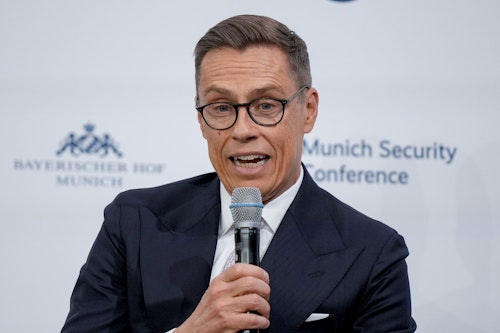
Meta global affairs officer says Europe needs to put 'rhetoric into action'
Meta Global Affairs Officer Joel Kaplan said Europe needs to put "rhetoric into action" during a panel on reviving European competitiveness.
Kaplan said that regulation in the tech sphere has put Europe at a "great disadvantage". He urged European officials to balance regulating social media channels with allowing competitiveness and competition to thrive.
His comments were more balanced than those given by US Vice President JD Vance, who blasted Europe a day earlier for "supressing free speech," seemingly taking aim at Europe's approach to regulating technology.
US and Russia speaking about peace, not war, Peskov says
Kremlin spokesperson Dmitry Peskov told TV state Kremlin reporter Pavel Zarubin that the significance of a phone call between Vladimir Putin and Donald Trump on Wednesday was that the pair were talking about "peace, not war," for the first time in a clip released on Sunday.
"This is a strong signal that we will now try to solve problems through dialogue," he said, adding that Western sanctions on Russia could be "lifted as quickly as they were imposed."
Putin and Trump spoke for more than an hour on Wednesday. After the call, Trump shocked European and Ukrainian leaders by declaring it was not practical for Ukraine to join NATO — an element Ukrainian President Volodymyr Zelenskyy has long made critical to any peace agreement.
'Less boredom' : Rama on what Albania could bring to the EU
Albanian Prime Minister Edi Rama said his country would aim to cut back on bureaucracy if his country was part of the EU. "Less boredom," Rama concluded.
Elsewhere he called the new Trump administration a chance for the EU to "wake up". He said Europe should think about strength and competitiveness, with the Western Balkans an opportunity for investment.
Where will Europe find the money to upscale its defence, Albanian PM asks
In a panel discussion on his countries EU accession, Albanian Prime Minister Edi Rama turned to a question on how Europe would fund upscaling its defence in response to limited US involvement.
"Europe has to think twofold, yes stronger militarily but also stronger economically," Rama said. He also questioned how the EU would fund extra defence spending, and whether it would redirect funds from other national directives.
Western Balkans: Ready to join the EU?
Ukraine has dominated this conference, but now we will take a look at something else: Western Balkan countries and their EU Accession.
The EU has repeated a familiar narrative since 2003: The countries of the Western Balkans that emerged from the disintegration of Yugoslavia, as well as Albania, should be in the European Union.
So far, however, only one has made the leap: Croatia joined in 2013. Serbia, Kosovo, Montenegro, North Macedonia, Bosnia and Herzegovina, and Albania are all at different stages in the lengthy process of joining the European Union with no concrete date for their inclusion.
Russia-Ukraine peace talks to kick off in Saudi Arabia, reports say
Senior Trump officials are gearing up to begin so-called peace talks between Russia and Ukraine in Saudi Arabia, Reuters and AFP have reported, citing US officials.
US national security adviser Mike Waltz, Secretary of State Marco Rubio and Trump's Middle East envoy Steve Witkoff will travel to Saudi Arabia, according to Politico.
Zelenskyy has said that his country hasn't yet received an invitation, underlining concerns that the US is planning to exclude both Ukraine and Europe from peace discussions.
Kallas: Russian authorities bear 'ultimate responsibility' for Alexei Navalny's death
Now on the something different: today marks one year since Russian opposition politician Alexei Navalny died in an Arctic penal colony.
Authorities in Russia have never fully responded to calls to clarify how Navalny died, only saying that his death happened while he was walking in the prison's yard.
"Russian authorities bear ultimate responsibility," for Navalny's death, the EU's top diplomat Kaja Kallas said.
"Alexei Navalny gave his life for a free and democratic Russia. Today, his lawyers remain unjustly imprisoned, together with hundreds of political prisoners. Russia must immediately and unconditionally release Alexei Navalny’s lawyers and all political prisoners," she added.
German Chancellor Olaf Scholz also paid tribute to the Russian opposition figure, saying that, "His courage made a difference and reaches far beyond his death."
Alexei Navalny died one year ago today – because he fought for democracy and freedom in Russia. Putin brutally combats freedom and its defenders. Navalny's work was all the more brave. His courage made a difference and reaches far beyond his death. pic.twitter.com/QCSP8ZZEv4
— Bundeskanzler Olaf Scholz (@Bundeskanzler) February 16, 2025
Europe needs to 'talk less, do more' - Stubb
Stubb said Europe needs to "talk less and do more" when it comes to Ukraine and European security.
The Finnish president said of European reactions to US proposals: "We need to listen what the Americans are saying, which is number one: take more responsibility for your own. "This is a clear message," Stubb said.
He added there was alot of "reflection" taking place in Europe, particularly on how to hike up defence.
"We need to think about ways in which Europe can give value added to a relationship with the US," Stubb said. "Don’t underestimate Trump as a negotiator, I genuinely believe that Putin is baffled and afraid what might be coming from there."
Polish FM should be 'careful' with the term 'European army'
Poland's Foreign Minister Radoslaw Sikorski has rejected calls from Zelenskyy to create a European army. One should be careful with the term "European army" Sikorski said, adding it could be understood in different ways.
He ruled out the unification of national armies, but said he was in favour of the European Union creating its own defence component. This should include, "an EU armed force worthy of the name," he said.
The deployment of Polish troops to Ukraine is not up for debate, Sikorski said, as Polish troops task in NATO was to protect their own territory.
Ukraine membership of EU and NATO 'non negotiable' - Finnish President
Finland's President Alexander Stubb has laid out that any kind of mechanism for ensuring peace should involve, the Ukraine, US and Europe.
He added that two things were "non-negotiable" — EU and NATO membership for Ukraine. "Ukraine will become part of Europe," Stubb said, adding that NATO membership should follow at some point.
Contrary to what Stubb believes, US officials have seemingly eschewed the idea that Ukraine should be part of Europe, with US Defence Secretary Pete Hegseth saying Ukraine's NATO membership was "off the table" last week.
What happened yesterday evening?
The past few days have seen European leaders try to come to terms with a shifting US rhetoric on the war in Ukraine — one that seemingly threatened to keep them away from the negotiating table.
Here's some things we missed from yesterday evening:
- Republican Senator Lindsey Graham said a potential deal between the US and Ukraine on rare earth minerals would be a "game changer" for the Trump administration's support for Ukraine. US President trump implied last week that $500B worth of mineral riches would be a good trade for continued US support to Ukraine. “They’re sitting on top of trillion dollars’ worth of minerals that all of us can benefit from,” Graham agreed.
- Finland's President Alexander Stubb said on Saturday that the US asked European allies to fill out a questionnaire detailing how many troops and capabilities they could deploy to Ukraine as security guarantees to end the war. "This will force Europeans to say that it's up to the Europeans to decide whether they actually answer the questionnaire or whether they answer it together," he said.
Stubb: US gave Europe ‘questionnaire’ on Ukraine security guarantees
The Finnish President called for calm among European leaders over the US announcement that peace talks between Washington and Moscow would start “immediately”.…
What's coming up today?
This morning we will be keeping an eye on several key panels and discussions.
Ones to watch out for is a panel on 'European Security Architecture 50 Years After Helsinki', which we will bring you updates from when it starts shortly at 9.15 am.
After that at 10.30 am we will follow a panel on accelerating the Balkans' EU accession.
There will be plenty of other news from the side lines of the summit and key announcements — so stay tuned.
Zelenskyy calls for 'armed forces of Europe'
Ukrainian President Volodymyr Zelenskyy said the time has come to create an 'armed forces of Europe' following several whirlwind days of speeches from US officials who called on Europe to step up for the security of their continent.
“Let's be clear, we cannot rule out the possibility that America may refuse to cooperate with Europe on issues that threaten it," Zelenskyy said.
"Without the Ukrainian army, European armies will not be enough to stop Russia. This is the reality. Only our army in Europe has real, modern warfare experience," the leader added.
Zelenskyy: Time has come to create an ‘Armed Forced of Europe’
Ukrainian President Volodymyr Zelenskyy said that he will not take NATO membership for Ukraine off the table, but “right now the most influential member of NAT…
A special EU summit, or not?
Yesterday, rumours swirled that EU heads of state and government would hold a special summit at short notice to discuss what have been several days of changes on the US' official position on Ukraine.
Polish Foreign Minister Radoslaw Sikorski announced the meeting on social media — then deleted it. He said during a panel on Saturday that the meeting would take place on Monday, with details finalised today.
The Élysée Palace hasn't yet confirmed the meeting — we will keep an eye out today to see if they do.
Good morning!
This is Tamsin Paternoster taking you the the third and final day of the Munich Security Conference, where world leaders have gathered to discuss security, defence and the war in Ukraine.
It's almost 9.00 am in Munich, so stay tuned as we bring you live updates throughout the day.
US Defence Secretary praises Poland as 'model NATO ally' during visit
Pete Hegseth made his first bilateral state visit as US Defence Secretary on Friday, meeting with Polish President Andrez Duda and Deputy Prime Minister Władysław Kosiniak-Kamysz in Warsaw.
“It’s quite intentional that our first European bilateral (visit) is right here in Poland,” Hegseth said after the meeting.
“We see Poland as the model ally on the continent, willing to invest not just in their defence but in our shared defence,” he added.
Poland gets it - strong militaries deter war,” Hegseth said following the meeting with his Polish counterpart in a statement on X, where he also rereferred to Poland as “NATO’s frontline state”.
US Defence Secretary praises Poland as ‘model NATO ally’
US Defense Secretary Peter Hegseth has lauded Poland as a “model NATO ally” in his first visit to Warsaw on Friday, where he met with President Andrzej Duda an…
Trump and the Nobel Peace Prize
Polish foreign minister Radosław Sikorski, aimed at Trump, said that Europe "controls the Nobel peace prize and if you want to earn it then the peace [in Ukraine] has to be fair."
Trump has repeatedly demonstrated confidence in his own abilities, famously calling himself a "very stable genius." His pursuit of the Nobel Peace Prize seems to stem from his belief that he could single-handedly resolve the Israeli-Palestinian conflict and other global issues, thus earning the ultimate recognition for peace.
German Vice Chancellor Habeck criticises Vance's speech
German Vice Chancellor Robert Habeck criticised US Vice President JD Vance after he spoke at the Munich Security Conference yesterday.
In an interview with RTL/ntv, Habeck said: "What Vance did yesterday is none of his business. That's clear. It's none of your business." Habeck then delivered a blunt message to Vance: "Take care of your own issues, there's plenty to do in the US."
Increased police presence in Munich
The Munich Police are heavily involved in security operations surrounding the Munich Security Conference with numerous officers deployed across various gatherings and events in the city.
On X, the Munich police department shared that "the force is working closely with colleagues from different areas to ensure a smooth and secure operation during the high-profile conference."
Bei zahlreichen Versammlungen rund um die #MSC2025 sind wir heute mit zahlreichen Kolleginnen und Kollegen im Einsatz.
— Polizei München (@PolizeiMuenchen) February 15, 2025
Wir begrüßen die zahlreichen Einsatzkräfte aus dem gesamten Bundesgebiet, die uns während der Sicherheitskonferenz unterstützen.
Weitere Infos folgen hier. pic.twitter.com/RMty7KJFh1
Kallas will hold informal meeting with EU foreign ministers
According to Anouar El Anouni, EU Spokesman for Foreign Affairs and Security Policy, posted on X that EU High Representative Kaja Kallas will hold an informal meeting of EU foreign ministers in Munich on Sunday to discuss recent talks with US and Ukrainian officials.
The EU High Representative @kajakallas will convene on Sunday an informal gathering of EU FMs present in Munich to take stock of the latest contacts with US and Ukraine officials.
— Anouar El Anouni 🇪🇺 (@AnouarEUspox) February 15, 2025
We are in a decisive moment for Ukraine’s and Europe’s future.
Europe stands with Ukraine.
Potential deal on Ukraine minerals a game-changer for US support for Kyiv
A potential deal between the US and Ukraine on rare earth minerals will be a “game-changer” for ramping up the Trump administrations support for Ukraine, says Republican Senator Lindsey Graham.
Ukraine is offering the US the right to mine critical minerals, including rare earth minerals in exchange for crucial military hardware in its fight against the Russian occupation, Euronews Europe correspondent Shona Murray writes.
“If the mineral agreement happens it’s a nightmare for Putin because we have something to defend that we didn’t have before”, Graham told the Munich Security Conference.
“They’re sitting on top of trillion dollars’ worth of minerals that all of us can benefit from” he said.
It’s a “game changer, because President Trump can go to the American people and say Ukraine’s not a burden it’s a benefit”, “so you better be pulling for this minerals agreement”, he said.
Meanwhile Graham told the conference that the US Senate was firmly behind America’s role and membership of Nato, despite some less committed pronouncements by US Defense Secretary Pete Hegseth who said European Security was no longer a primary priority for the US.
Trump’s Ukraine-Russia envoy: Ukrainians will be at the negotiating table, Europeans - not necessarily
General Keith Kellogg said the US position on the peace talks foresees Ukraine's participation, but other European representatives are not necessarily included, Euronews Europe correspondent Sasha Vakulina writes.
Speaking at the traditional Ukrainian lunch during the Munich Security Conference, Donald Trump’s special envoy for Ukraine-Russia negotiations repeatedly said that Kyiv will and should be a participant in the negotiations.
"The United States has never said that Ukrainians should be excluded from the discussion."
But he did not mention the participation of other European states. When asked by the host of the meeting to explain further, Kellogg said that he was a "realist”, explaining that he was not against the participation of European politicians in the peace negotiations, but he doesn’t consider it necessary to involve those, who were "part of the problem".
"Recall Minsk-2 – there were a bunch of European leaders there, and they failed terribly."
After Russia’s first invasion of 2014 Ukraine tried to negotiate with Russia. Those attempts resulted in the Minsk 1 and Minsk 2 agreements, which Moscow did not respect, followed by the full-scale invasion mere years later.
Washington was not part of the Minsk agreements. The negotiations were mediated by the leaders of France and Germany in the so-called Normandy format.
But Washington was a signatory to the Budapest memorandum, which committed the US, Russia and the UK, among other things, to "respect the independence and sovereignty and existing borders of Ukraine", to "refrain from the threat or use of force" and providing security guarantees for Ukraine in exchange for Kyiv giving up its nuclear arsenal - the third largest in the world at the time.
Ukraine’s negotiating conundrum: Ceasefire and more sacrifice
As Russia’s full-scale invasion of Ukraine nears a three-year mark, there is a sign of a possible end to the war. The new US administration is pushing forward…
Lammy: UK will support Ukraine 'as long as the war continues'
British Foreign Secretary, David Lammy, emphasised the critical role the UK and US played in exposing Putin's intentions to invade Ukraine by sharing vital intelligence with the world.
He also praised the cross-party consensus in the UK, which has ensured ongoing and unwavering support for Ukraine, explaining that the UK has committed £300 billion to support Ukraine for "as long as the war continues".
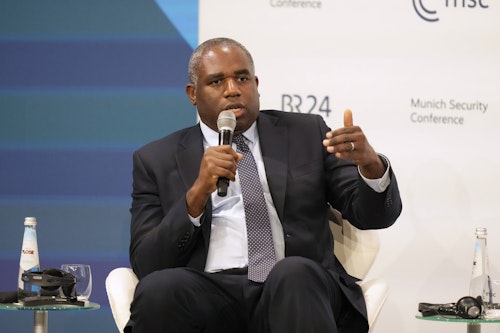
He pointed out that successive US presidents have urged NATO allies to contribute more, with the UK committing 2.5% of its GDP to defence spending
Lammy posed a key question for Europe, noting that, when combined, only 0.01% of Europe’s GDP is going towards Ukraine's defence and reiterated the irreversible pathway for Ukraine towards NATO membership.
Sikorski: emergency summit in Paris
French President Emmanuel Macron has called an emergency summit of EU leaders in Paris to address the situation in Ukraine and respond to Donald Trump's actions, Sikorski said during the foreign ministers panel talk.
Cieszę się, że premier @donaldtusk uda się w poniedziałek na zaproszenie prezydenta @EmmanuelMacron na spotkanie liderów europejskich. Potrzebujemy pokazać naszą siłę i jedność. pic.twitter.com/yUf4fq2ixv
— Radosław Sikorski 🇵🇱🇪🇺 (@sikorskiradek) February 15, 2025
French Foreign Minister Barrot: Europe is a superpower and must scale up defence
French Foreign Minister Jean-Noël Barrot asserted that Europe is a global superpower, highlighting its role in pushing back Russia’s full-scale invasion—despite Moscow’s previous reputation as a military giant.
He acknowledged the major challenge of increasing defence spending, stressing that it must "create jobs and value" to be accepted by the public. Barrot emphasised that quality matters as much as quantity in military investments and made clear that the "era of the peace dividend is over."
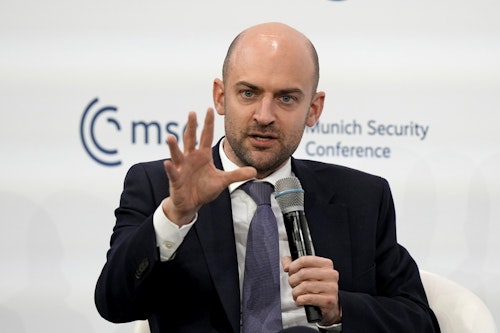
'Trade war'
On the issue of trade wars, Barrot warned that no one should consider entering a trade war with Europe.
Barrot made it clear that if Europe is targeted in a trade conflict, it will retaliate to protect its interests, adding, "If deterrence is not enough, we will act."
To safeguard Europe’s long-term prosperity, Barrot stressed the importance of diversifying relationships, with the European Commission planning to strengthen ties with India and Latin America. He concluded that "stronger relationships will make us thrive."
Polish Foreign Minister Sikorski: We must respond to Putin’s threat
Polish Foreign Minister Radosław Sikorski condemned Vladimir Putin as an "indicted war criminal" who has made Russia more authoritarian. Addressing concerns over reports of Trump-Putin calls, Sikorski downplayed worries about Europe not being consulted, but made clear: "If Trump says European troops will be part of a deal, we have to be asked to supply them."
Highlighting Poland’s military preparedness, he noted that the country now spends 4.7% of its GDP on defence—well above NATO’s 2% target - "because we’re scared."
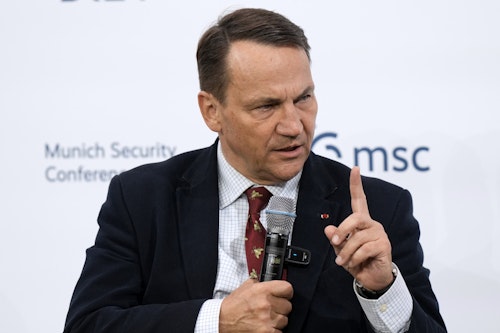
He welcomed French President Emmanuel Macron’s initiative to bring European leaders together in Paris, stressing the need for a unified response. He talked about Macron's remarks that Europe "can’t just buy external defence".
Security guarantees for Ukraine
Sikorski cautioned against offering Ukraine vague security guarantees, recalling that past assurances—such as those given when Ukraine gave up its nuclear arsenal—proved meaningless.
"Ukraine already had guarantees that turned out to be empty", he said, questioning the value of new commitments.
"If we offer a guarantee and Russia invades, what does that mean? Do we go to war with Russia?" He warned that "nothing is more dangerous than an empty guarantee in international relations," as it shifts responsibility without real consequences, ultimately weakening deterrence.
Baerbock: Europe must be strong, bold, and united
German Foreign Minister Annalena Baerbock called for European unity and determination in supporting Ukraine, stressing that the continent must remain strong "as long as it takes."
Speaking three years after Russia's full-scale invasion, she highlighted a newly formed security package aimed at ensuring "lasting peace – also for our grandchildren."
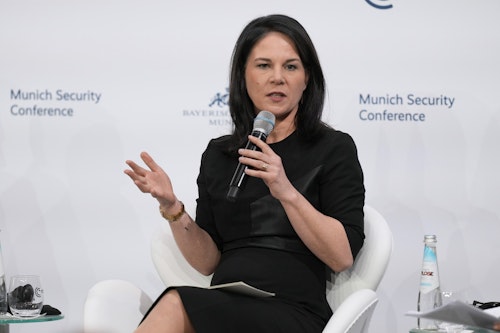
"We are here, and we won't leave our continent", Baerbock declared, reaffirming Europe's commitment to defending its values. She referenced to a speech made the previous day—likely by U.S. Vice President JD Vance—stating that people must choose whether they stand with the free world or not.
"Our biggest enemy is Putin’s Russia", she concluded, underlining the ongoing threat to European security.
Call for European unity
Baerbock called for European unity and greater responsibility in securing the continent's future.
"We are sitting here as Europeans—EU and UK together", she said, adding that despite having heard different views from the American side, the "reality is on the ground". "This moment is crucial for Europe," she said. Baerbock stressed that the war in Ukraine is not just about Ukraine but about the security of Moldova, NATO, and the entire free world.
While NATO has become stronger, Europe must still step up. She reaffirmed that Ukraine’s path to NATO remains open, calling it the "cheapest option" for long-term security. Deploying soldiers or sustaining military aid is far more expensive. "Europe has to do more, and Europe will do more", she declared, adding that peace is only possible through unity.
🇩🇪 Minister for Foreign Affairs @ABaerbock (@AuswaertigesAmt) talked about the old continent’s new geopolitical role with @DavidLammy, @jnbarrot, @sikorskiradek, and Silvia Amaro at #MSC2025. pic.twitter.com/4GJVXIS9Nd
— Munich Security Conference (@MunSecConf) February 15, 2025
Zelenskyy meets Norwegian PM at Munich Security Conference
Ukrainian President Volodymyr Zelenskyy met with Norwegian Prime Minister Jonas Gahr Støre at the Munich Security Conference to discuss strengthening Ukraine's defence capabilities and ensuring a "just and lasting peace".
In a post on X, he said the topic discussed was Ukraine's domestic arms production, particularly focusing on long-range missiles and drones.
Zelenskyy highlighted Norway's role in directly investing in Ukraine’s defence industry and confirmed that both countries would "continue this cooperation".
During my meeting with Norwegian Prime Minister @jonasgahrstore, we discussed the efforts needed to achieve a just and lasting peace.
— Volodymyr Zelenskyy / Володимир Зеленський (@ZelenskyyUa) February 15, 2025
A key focus was on Ukraine’s arms production, particularly the production of long-range missiles and drones. Norway is already directly investing… pic.twitter.com/nqPVeiDgn1
Scholz: Germany won't accept people who 'intervene in our democracy'
In a speech on Saturday morning, German Chancellor Olaf Scholz defended his stance against the far right and said Germany will not accept people who "intervene in our democracy", a day after US Vice President JD Vance met with the AfD leader and criticised European leaders.
Speaking at the Munich Security Conference on Friday, Vance criticised European governments' approach to democracy and said he fears free speech across the continent is "in retreat".
Scholz: Germany won’t accept people who ‘intervene in our democracy’
German Chancellor Olaf Scholz has said his country won’t accept people who “intervene in our democracy”, a day after US Vice President JD Vance criticised Euro…
China at the Munich Security Conference: a controlled distance?
China maintained a stance of "controlled distance" at the Munich Security Conference yesterday, presenting itself as a stabilising force in an increasingly chaotic world.
Foreign Minister Wang Yi framed Beijing as a champion of the Global South and a key player in a multipolar world order, offering an alternative to Western dominance. Despite its diplomatic overtures, China's core positions remain unchanged—it continues its partnership with Russia while deepening economic ties with Europe.
European leaders remain split on how to engage with Beijing, torn between a more confrontational stance and a cautious, pragmatic approach.
Regarding China’s relationship with the US, Yi warned that if Washington insists on suppressing China, Beijing will "play along to the end." However, he stressed that China has no interest in conflict with the US.
Europe quietly works on plan to send troops to Ukraine for post-war security
According to a report by the Associated Press, Western partners, primarily Britain and France, have been quietly discussing a plan to send troops to Ukraine, writes Euronews Europe Correspondent Sasha Vakulina.
However, details of the plan remain vague, as the countries involved are hesitant to disclose information that could give Russian President Vladimir Putin an advantage in potential peace negotiations.
British Prime Minister Keir Starmer confirmed that the UK would play a role in providing security guarantees for Ukraine if peace is achieved. The discussions began about a year ago, but the urgency has increased due to concerns that US President Donald Trump might bypass European and Ukrainian efforts to negotiate with Putin.
Europe mulls plan to send troops to Ukraine for post-war security
A group of European countries has been quietly working on a plan to send troops into Ukraine to help enforce any future peace settlement with Russia, with the…
Merz still open to send Taurus missiles to Ukraine
During a panel discussion, CDU/CSU chancellor candidate Friedrich Merz stated that he does not rule out sending Taurus missiles to Ukraine. He emphasised that Germany should be prepared to provide these long-range cruise missiles, but only in alignment with European partners.
In contrast, German Chancellor Olaf Scholz (SPD) has firmly opposed the delivery of Taurus missiles, arguing that the risk of Germany becoming involved in the war is too great. Scholz’s position is reflected in his party's manifesto ahead of the snap elections in February 2023, which explicitly excludes sending Taurus missiles.
Merz pointed out that the UK and France are already supplying cruise missiles to Ukraine and called for a unified approach with European allies on the issue.
Amid uncertainy over US policy on Ukraine, Zelenskyy says it's time for an 'Armed Forces of Europe'
Ukrainian President Volodymyr Zelenskyy said that he will not take NATO membership for Ukraine off the table, but “right now the most influential member of NATO seems to be Putin because he seems able to block NATO decisions.” Zelenskyy also called for the creation of an 'Armed Forces of Europe', writes Euronews Europe Correspondent Sasha Vakulina.
"The EU will not cope on its own, but neither will we", he stated, reiterating his stark warning that Russia could attack NATO countries as early as next year, with preparations for an attack potentially already underway.
Zelenskyy: Time has come to create an ‘Armed Forced of Europe’
Ukrainian President Volodymyr Zelenskyy said that he will not take NATO membership for Ukraine off the table, but “right now the most influential member of NAT…
'No space and place for complacency’ over European defence, Latvian defence minister tells Euronews
In a one-on-one interview with Euronews on the sidelines of the Munich Security Conference, Andris Spruds said that he is confident that the EU can deter Russia today and in the years to come, but warned that the necessary investments must be made “right now”.
“I think the important part is to be ready in that any aggressiveness from Russia can just come now and we have to be resilient and we have to build. Of course, it's an ongoing process.”
He said the EU must expand its defence industry base and build up its capabilities and that joint EU funding should be used to boost air defence - for which systems can have billion euro price tags - as well as more “practical things like ammunition”, and on new technologies including drones.
“Last year we made big steps, considerable steps in building up our drone army,” Spruds said. “But we have to make the next steps, which include land drones, and also drones in the sea.”
Read the full interview here:
Latvian minister: ‘No space and place for complacency’ over defence
EU leaders are trying to come up with solutions to boost joint financing in defence with the Commission estimating the bloc needs to invest €500 billion over t…
Push for stronger support for Ukraine and NATO-membership
Petr Pavel, President of the Czech Republic, suggested a "Marshall plan for Ukraine" to aid in reconstruction, combat corruption, and support Ukraine's EU accession, adding that it would "prove that Russia's plans for Ukraine have failed". He stressed that "Ukraine success would be Russian failure in Ukraine", reports Shona Murray, Euronews Europe Correspondent.
Mette Frederiksen, Prime Minister of Denmark, pointed out the lack of progress in supporting Ukraine's needs: "We are still not providing Ukraine with what is needed". She highlighted the failure to deliver promised air defence systems and argued "if Ukraine was a member of NATO, we wouldn't have had the war". For her, NATO-membership is the "cheapest and easiest way of protecting Ukraine".
Merz also focused on military system improvements: "We strongly need simplification and standardisation of our military systems" and that "economy of scale is as important as new money investment." The CDU/CSU-chancellor candidate also warned that failure to act soon would have grave consequences for the European Union. On Ukraine's NATO membership, he reminded of the alliance's joint membership agreement and disagreed with postponing membership "before negotiations".
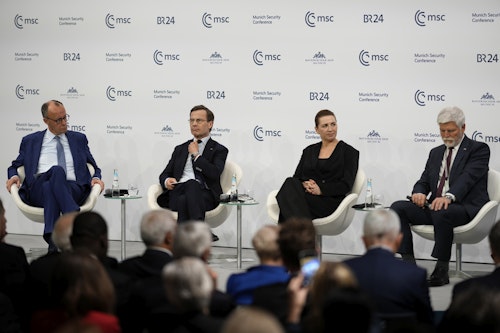
Ulf Kristersson, Prime Minister of Sweden, questioned NATO's character: "It tests the character of NATO if we give an irreversible path to NATO one minute and reverse it the next." He also highlighted NATO's efforts in the Baltic Sea: "The Russian shadow fleet is heavily present in the Baltic Sea."
Frederiksen expressed concerns about potential disagreements over sanctions: "There is a risk on sanctions rollover and some countries not agreeing", while remaining optimistic about NATO and the EU. Czechia's Pavel also reiterated his belief in the US-EU alliance: "Being allies gives us an opportunity to be open and blunt if necessary" and stressing the need to "find the strength to speak up" under pressure.
'Lack of German leadership'
Friedrich Merz, addressing the need for strong German leadership, stated, "There is a lack of German leadership in Europe - and I am willing to do that." He also expressed support for sending long-range missiles to Ukraine, noting that "we have a majority in the German parliament for sending long-range missiles" and expressed hope for similar approval in the next parliament.
Merz also reflected on the shifting dynamics in transatlantic relations, emphasizing, "We are seeing fundamental changes in the transatlantic relationship." He continued by sharing his regret over the UK's exit from the EU, saying, "I still regret the UK left the EU - it wasn’t necessary - we all know why it happened," and called for efforts to bring the UK closer to the EU "within NATO and beyond".
Should the EU implement a European preference for defence spending? Member states are divided
Leaders from the EU's 27 member states are currently wrestling with how to plug a defence spending gap of €500 billion over the coming decade to continue supplying Ukraine with what it needs to defend itself and ensure the bloc can protect itself, alone, if needed.
Ramping up European defence production is one of the key goals of the strategy leaders have tasked the European Commission to map out - a need made all the more salient by the bloc’s failure to make good on its pledge to deliver one million shells to Ukraine in the year ending in March 2024, only managing to produce about half the amount.
One proposal on the table, championed by France's Emmanuel Macron, is for a so-called European preference for joint defence spending, thus ensuring EU money goes to EU manufacturers.
The industry agrees, calling it a "strategic imperative", but some member states are not enthusiastic, arguing it could antagonise US President Donald Trump whose approach to global politics is very transactional.
Find out more here:
European preference for defence spending ‘imperative’, industry says
EU member states are currently negotiating whether to roll-out a so-called European preference for bloc-level defence spending. #EuropeNews
CDU-chairman Merz addressing 'the elephant in the room'
Friedrich Merz addressed transatlantic relations, stating: "I want to address the elephant in the room, the transatlantic relations." He emphasised the importance of respecting election outcomes: "My first comment is outcome of US elections: we respect the outcome of the US elections, and we expect the US to do the same."
The CDU-chairman and chancellor candidate also defended press freedom: "We would never kick out a news agency from our chancellery", and highlighted that "courts decide on hate speech."
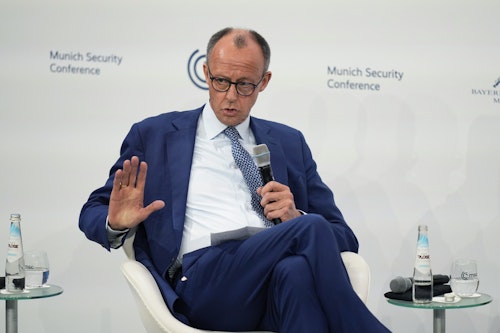
Regarding trade, Merz expressed a desire for cooperation with the US: "We look for close cooperation with Trump administration and American market – we believe in free trade and we would like to see tariffs brought to zero. We don’t believe in trade conflict."
Merz underscored the broader implications of the situation: "This is not just challenging Ukraine, it's challenging the entire world order." He also stressed the need to strengthen Ukraine: "We have to do everything we can to bring Ukraine to a position of strength", and criticised the absence of Ukraine and Europe in negotiations: "It’s unacceptable that US and Russia are negotiating without Ukraine and Europe at the table."
Frederiksen: Europe needs to defend itself
Mette Frederiksen, Prime Minister of Denmark, also stressed the need for Europe to defend itself against Russian aggression. She stated: "If we allow Russia to take decisions on Europe in 2025, that’s not the right way."
Frederiksen also highlighted the importance of ensuring a just peace, saying: "It can only be a just peace if we are sure Russia will not come back in Ukraine or anywhere else in Europe."
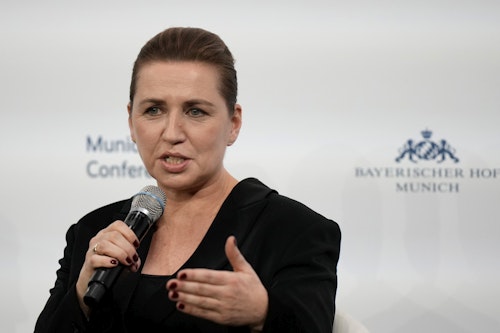
She concluded the need for increased defence spending: "We are part of this and at the same time we have to be able to defend ourselves - we have to spend much more on defence and security."
Pavel: Europe must define its own position on Ukraine
The President of the Czech Republic, Petr Pavel, emphasised Europe's need to take responsibility in the ongoing war in Ukraine, writes Euronews Europe Correspondent Shona Murray.
He stated: "We can do a lot on our own with or without US allies", adding that if the solutions presented by the US differ from Europe's, the EU must "define our own European position".
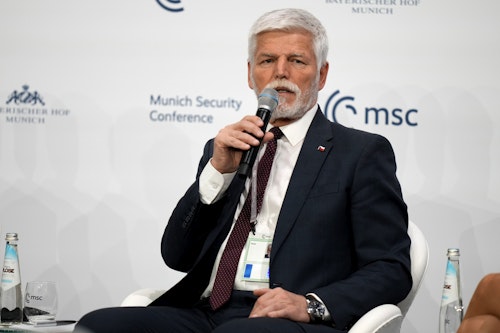
Pavel highlighted the importance of being involved in decision-making, asserting, "If we are to take more responsibility for Ukraine and Europe, we have to be at the table – otherwise we echo a situation the Czech Republic knows a lot about."
Costa: 'We are not giving up' on supporting Ukraine
At the Munich Security Conference, President of the European Council António Costa delivered a resolute message: "Today my message is clear. We are not giving up", reports Shona Murray, Euronews Europe Correspondent.
He reaffirmed Europe's commitment to continue supporting Ukraine as an integral part of its peace efforts. He also stated that "imposing concessions before negotiating is a mistake."
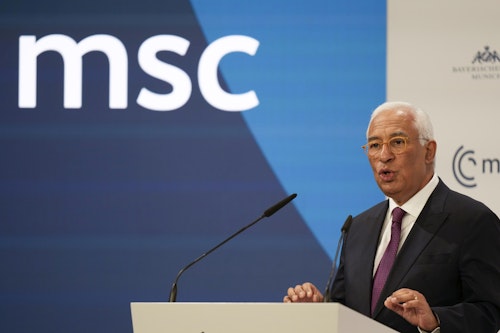
Costa defined what a comprehensive, just, and lasting peace means: "It means that peace in Ukraine and Europe's security cannot be separated." He emphasised the broader Russian threat, pointing out that "Russia dominates Belarus", "Russia has a military presence in Moldova and Georgia", and "Russia casts a shadow over the Baltic States, the European Union's eastern border, our democratic systems, our critical infrastructure."
He concluded by referencing the EU's commitment to defence: "Less than one month after the beginning of the war, in Versailles, all Member States decided to effectively deliver on building a Europe of Defence. Our defence spending rose by 30% since 2021."
Vice President Vance met Merz, but not Scholz, at Munich Security Conference
At the Munich Security Conference, Friedrich Merz, leader of the CDU and chancellor candidate, proposed a peace process for Ukraine, suggesting that the US and Russia begin talks to establish a ceasefire.
Posting on X, Merz said that this could serve as a confidence-building measure following a 20-minute meeting with US Vice President JD Vance at the beginning of the conference. He emphasised the importance of close cooperation between the US and Europe in achieving lasting peace in Ukraine, agreeing with Vance that the war must end quickly.
The meeting took place amid growing concerns in Europe about recent statements from the Trump administration regarding its stance on Ukraine. These have sparked alarm, particularly after Trump's phone call with Russian President Vladimir Putin and the suggestion that NATO membership for Ukraine post-war was unrealistic. Chancellor Olaf Scholz criticised this approach, warning of the dangers of a "dictated peace".
During his speech yesterday, Vance reaffirmed the significance of transatlantic relations and noted that Europe should continue investing in its own security. He also raised concerns about freedom of expression in Europe, highlighting cases of European governments pursuing accusations of misinformation, including a raid over misogynistic content on online platforms in Germany.
Merz's interaction with Vance was seen as positive, with reports of an open and productive conversation.
Vance chose not to meet with Chancellor Scholz, a decision that sparked political sensitivity, given the upcoming German federal election. However, reports suggest scheduling conflicts prevented the meeting.
At the beginning of #MSC2025, I met with U.S. Vice President @JDVance. We agreed that Russia’s war of aggression against Ukraine must come to an end as soon as possible. We also shared the view that the path to lasting peace can only succeed through close coordination between…
— Friedrich Merz (@_FriedrichMerz) February 14, 2025
Former Ukrainian foreign minister: 'Politicians have to focus their efforts on defending the country and ensuring unity in Ukrainian society'
Former Ukrainian Foreign Minister Dmytro Kuleba told Euronews a few days ago that he does not believe it is the right time for elections in Ukraine.
"Moreover, I believe any conversation about elections in Ukraine at this point is premature and works against Ukraine's interests. Politicians have to focus their efforts on defending the country and ensuring unity in Ukrainian society. I despise politicians who dived into the electoral process in February 2025. It's too early. It's time for Ukrainian politicians to become statesmen. Statesmen think of the country; politicians think of winning elections", he told Euronews.
Video. A bad deal for Ukraine is a win for Putin — ex-Foreign Minister Kuleba
Video. Euronews has spoken to former Ukrainian Foreign Minister Dmytro Kuleba about his expectations from Europe and the Munich Security Conference.
Zelenskyy on Security, Elections, and US talks: 'the question Is today'
After his speech, Ukrainian President Volodymyr Zelenskyy sat down with CNN’s Christiane Amanpour for a Q&A session.
He stated that Ukraine requires a larger army, comparable to Russia's, if it remains outside NATO.
Regarding foreign troops, Zelenskyy said he is open to the initiative, noting that while most details are understood, they still need to be discussed with world leaders. He avoided going into specifics, saying, "We don't want to be loud about it", but confirmed that such a move would be beneficial.
He also talked about the US Treasury Secretary's visit to Ukraine to discuss the Trump's administration's interest in rare earth minerals, with negotiations ongoing. Addressing President Donald Trump's reported demand for $500 million, Zelenskyy remarked that different US administrations have had different approaches and that Ukraine remains in a process of dialogue.
On Ukraine's political situation and the absence of elections, Zelenskyy said his focus throughout his term has been on ensuring the survival of the country. "Half of my term was COVID, the other half a war against Putin", he noted.
While he expressed willingness to discuss elections, he stated that right now, the priority is maintaining national unity and protecting Ukraine's future. "It’s about today. The question is today - saving Ukraine's independence, our future, our hopes."
He dismissed critics, saying that those unhappy with the situation "can change citizenship—they have real estate."
Zelenskyy: 'The Armed Forced of Europe should be created'
Ukrainian President Volodymyr Zelenskyy issued a stark warning about Russia’s intentions, revealing intelligence that suggests Moscow plans to send troops to Belarus under the guise of training exercises this summer - just as it did in 2022. "Maybe it’s meant for you", he cautioned.
He questioned how allies would respond if Russia launched a false-flag attack from Belarus, pressing whether they would act at all. Referencing US Vice President JD Vance's statement that "from now on, things will be different", Zelenskyy urged European leaders to take action for their own security. "I believe in Europe, and I am sure you believe too. Ukraine’s army is now holding back Russia. If not us—who will stop them?"
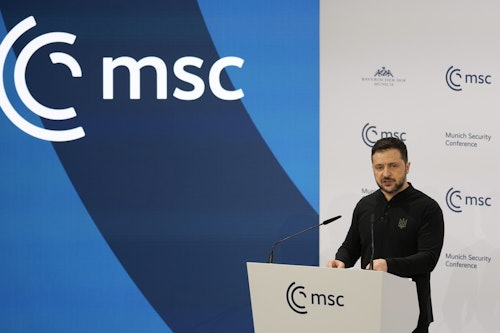
Reaffirming Ukraine's sovereignty, he insisted that no deals should be made behind Ukraine’s back and that the same principle should apply to all of Europe. "No decisions about Ukraine without Ukraine, and no decisions about Europe without Europe. Anything else is zero." He made it clear that Europe faces a choice: "If not Brussels—then Moscow. It is your decision."
Addressing NATO, Zelenskyy refused to take Ukraine's potential membership off the table but pointed out that, at present, the most influential force in the alliance seemed to be Putin—since he appeared capable of blocking NATO decisions.
He posed a direct question to European leaders: "If Russia came for you - could your army fight the same way?" He stressed that he did not want any country to face that reality, which is why Ukraine demands security guarantees. "For us, it is either NATO membership or the conditions to build another NATO here in Ukraine. Because at some point, there will be a border between war and peace."
Putin wants ceasefire to regroup, not to end the war, Zelenskyy said
Volodymyr Zelenskyy said the reason Putin wants to start peace talks in order to regroup and rebuild Russian forces during the period of a ceasefire, Euronews Europe correspondent Sasha Vakulina writes.
In an interview with Meet the Press on NBC News from the Munich Security conference he said Putin's participation in the talks is not aimed at ending the war but at reaching a ceasefire agreement, which would help lift international sanctions.
"This is really what he wants. He wants pause, prepare, train, take off some sanctions, because of ceasefire etc," Zelenskyy said.
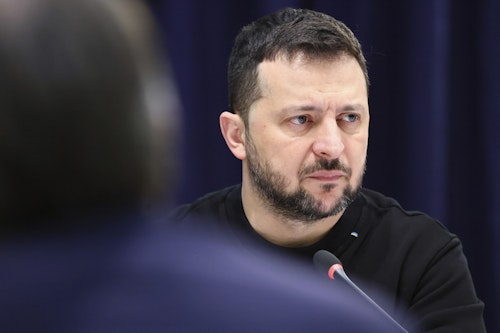
He also admitted that Ukraine would find it extremely difficult to survive without military support from the United States, both now and after the war ends.
He said that continued military support from the US is critically important for Ukraine's defence and its future.
"Probably it will be very, very, very difficult. And of course, in all the difficult situations, you have a chance. But we will have low chance, low chance, to survive without support of the United States. I think it’s very important, critical", he said, admitting that he does not even want to imagine a scenario in which Ukraine is left without a strategic partnership with Washington.
Olaf Scholz: 'Never again' incompatible with AfD and Russian aggression
German Chancellor Olaf Scholz opened his speech by referencing the proximity of the Munich Security Conference to the former Dachau concentration camp, stressing that the memorial there serves as a reminder of why Germany must ensure that such atrocities never happen again.
He reaffirmed that "never again" is a historical mandate that Germany must and wants to uphold—never again fascism, racism, or war of aggression. Scholz sharply criticised the far-right AfD, noting that some members of the party had referred to Nazi crimes as a mere "bird shit" in history. He made it clear that the principle of never again is incompatible with supporting or aligning with the AfD.
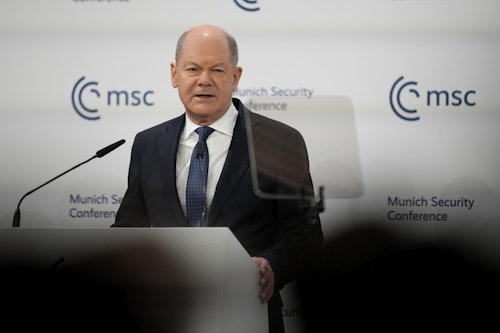
The future of democracy in Germany, he said, is in the hands of its people. On Ukraine, he reiterated a shared goal: preserving Ukraine's independence. He stressed that nothing should be decided about Ukraine without Ukraine’s involvement and defended ongoing talks that now include both Ukraine and Russia.
Scholz warned of an escalating and globalising war due to Putin's actions, citing sabotage, arson attacks, and disinformation campaigns. He underscored that anyone attempting to shift borders by force is undermining Europe's peace order, and this principle must hold universally. There will be no dictated peace—Ukraine will not be forced into an agreement that compromises its sovereignty. He dismissed the notion of decoupling American and European security interests, stating that Europe will negotiate while ensuring its own interests are represented.
The commitment to supporting Ukraine "for as long as necessary" does not end when the fighting stops, he affirmed. Scholz made clear that Ukraine must be backed in a way that prevents future aggression and emphasised that Ukraine cannot stand alone and requires continued support from both the EU and the US, noting that the US and Germany remain its largest supporters.
UK military too 'run down' to lead Ukraine peacekeeping mission: ex-army head
Lord Dannatt, who led the British army from 2006 to 2009, told the BBC that the UK military is "so run down" that it couldn't lead a future peacekeeping mission in Ukraine.
Estimates put the number of troops needed for such a mission at 100,000 with the Europeans expected to provide most of them. As France and the UK have the biggest armies on the Old Continent, Britain would have to supply "quite a proportion of that and we really couldn't do it," Lord Dannatt told BBC Radio 4's The Week in Westminster.
"Our military is so run down at the present moment, numerically and as far as capability and equipment is concerned, it would potentially be quite embarrassing."
"I mean, if we were to deploy 10,000 troops, each rotation for six months, that would effectively tie up 30,000 or 40,000 troops and we just haven't got that number available," he added.
Day two of this year's Munich Security Conference
Good morning from day two of the Munich Security Conference.
German Chancellor Olaf Scholz has opened the day with a speech condemning US Vice President JD Vance's meeting with far-right AfD leader Alice Weidel and reiterated Germany's support for Ukraine.
Later on, Ukrainian President Volodymyr Zelenskyy is set to speak, as well as European leaders discussing continued support for Kyiv.
Follow our live blog for real-time updates throughout the day.
Conference hall disperses into the Munich night
The main conference panels have now wrapped up for the day, though bilaterals will flow into the chilly Munich night, in the city's bierkellers and restaurants.
Euronews liveblog will fire up for another round of this crucial security meeting when it starts tomorrow morning.
In the meantime please read our on the ground correspondent Alice Tidey's summation of how the day left the Transatlantic alliance.
In Munich, the EU seeks closer ties with the US, the US blasts the EU
Tariff decisions from the new US administration have sparked fears of a trade war with the EU, while Trump’s Putin call announcement have left the bloc reeling…
Echoes of Munich 1938
Earlier we posted Volodymyr Zelensky's statement that he didn't want to sign a peace agreement in Munich, noting that the Munich Agreement of 1938 resonated badly.
Here's Euronews political editor Stefan Grobe's take on those echoes.
China throws Europe a lifeline
With Europe desperate to claw its way to a place at any peace negotiating table over Ukraine after Donald Trump touted exclusive three-way talks between the US, Russia and Ukraine, help has come from an unlikely quarter – China.
“The US reached common understanding with Russia and we believe that all parties and all stakeholders should in appropriate time participate in peace talks process,” Wang Yi, Minister of Foreign Affairs of China, said.
“This war is on European soil and Europe should play an important role in the process,” he said, in words that might easily have been uttered by Commission President Ursula von der Leyen.
Zelenskyy: No peace agreement in Munich, remember last time
Volodymyr Zelenskyy has told the conference that he wants no part of an agreement that echoes the Munich Agreement of 1938 which opened the door to the appeasement of Adolf Hitler right before World War II.
“A peace agreement cannot be signed in Munich, we remember what was signed here, I will not repeat it,” the Ukrainian president said, adding, “I don’t want to be that person in history who helped (Russian President Vladimir) Putin occupy my country.”
“I'm ready to meet with US Vice President Vance. I'm not ready to sign everything, but I'm ready to discuss the agreement on our minerals,” Zelenskyy said during the "Strategic Investment: The Future of US-Ukraine Security Cooperation" panel.
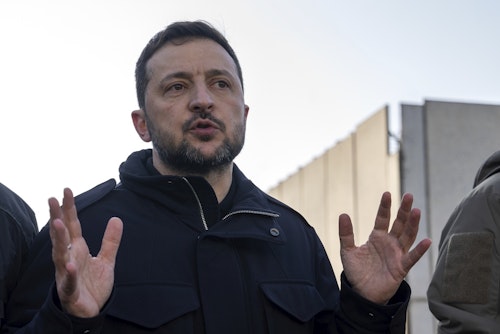
Chinese foreign minister: Beijing can't stop buying gas from Russia
“Can China stop buying gas from Russia? Which country can then provide so much gas to meet the needs of the Chinese people? This is not possible," Wang Yi, Minister of Foreign Affairs of China, said.
"Some countries tend to politicize economic and trade issue, but we must be responsible to our own people,“ Yi stressed.
Russia is the third largest liquefied natural gas (LNG) supplier to Beijing in the seaborne market. In the period between January and October, Moscow supplied 6.74 million metric tonnes of LNG, according to S&P Global.
US Vice President JD Vance questions Europe's retreat from 'most fundamental values'
When it comes to Europe, the threat the US fears most is not from Russia, China or any other external actor but from within, US Vice President JD Vance said in Munich, questioning whether Europe has withdrawn away from what he said were the continent's "most fundamental values".
"The retreat of Europe from some of its most fundamental values, values shared with the United States of America," he said, referring to Romania's cancelled elections in December.
Romania's top court annulled the first round of the election over procedural issues and the release of secret Romanian intelligence reports showing Russian involvement in influencing voters through an anti-Western propaganda campaign supporting far-right candidate Calin Georgescu.
"Of all the pressing challenges that the nations represented here face, I believe there is nothing more urgent than mass migration," he added.
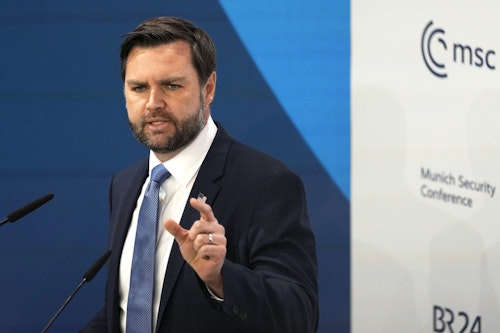
Source: AP
EU Commission to activate fiscal escape clause to boost defence spending
"A stronger Europe is better for all of us," said Ursula von der Leyen on Friday, stressing that Europe needs a bolder approach to ensuring its security.
To this end, the EU Commission will propose to activate the escape clause for defence investments, von der Leyen announced in Munich. "This will allow member states to substantially increase their defence expenditure," she said.
The EU executive will also propose a broader package of tailor-made instruments to address the specific situation of each member state, from its current level of defence spending to its fiscal situation.
A massive defence package will be among von der Leyen's new defence and security initiatives. "We also need a European approach in setting our investment priorities. This will allow investment in urgently needed defence projects of common European interest," she said.
EU Commission to activate fiscal escape clause to boost defence spendi
The EU Commission will propose to activate the escape clause for defence investments, Ursula von der Leyen announced in Munich. “This will allow Member states…
Putin must prove he has given up destroying Ukraine, says von der Leyen
“A failed Ukraine would weaken Europe, but it would also weaken the US,” EU Commission President Ursula von der Leyen told the audience of the Munich Security Conference on Friday.
Von der Leyen argued that, otherwise, it would be a threat to US-EU shared interests, and added that only by working together with Washington, Ukraine can get a lasting peace.
“President Putin says he's willing to meet, but on what terms? It is up to him to demonstrate that his interest is not to prolong this war. It is up to him to show that he has given up his ambition to destroy Ukraine,” the Commission president said.
“Ukraine needs peace through strength,” she argued.
The Commission president also said they will keep working to accelerate Ukraine’s accession to the EU.
Our task here at the @MunSecConf is not just to describe this new geopolitical landscape but to shape it.
— Ursula von der Leyen (@vonderleyen) February 14, 2025
And shape it in a way that ensures that our European values endure and our interests are defended ↓ https://t.co/cGy0X7la6o
Zelenskyy: Putin may attack a NATO country as early as next year
Ukraine’s president issued a stark warning, saying that Russia may be preparing an act of aggression against NATO members as early as next year, Sasha Vakulina reports.
Speaking at the Munich Security Conference on Friday, Volodymyr Zelenskyy said the attack might come from Belarus.
“Russia is preparing 15 divisions. Around 100-150,000 troops are being trained to aggravate the situation on the Belarus direction,” Zelenskyy said. “I am not sure if they will attack Ukraine, but they will attack. Maybe Ukraine, maybe Poland, maybe the Baltic countries.”
Putin may attack a NATO country from Belarus next year, Zelenskyy says
Ukraine’s president issued a stark warning, saying that Russia may be preparing an act of aggression against NATO members as early as next year. Speaking at th…
Ukraine joining NATO 'unrealistic', Vance said
Analysts, particularly in Europe, will be watching the meeting between JD Vance and Ukrainian President Volodymyr Zelenskyy later on Friday, hoping to get at least some insight into Trump's ideas on how to end the war in Ukraine.
Both Trump and US Defence Secretary Pete Hegseth earlier this week undermined Ukraine's aspirations to join NATO, which the transatlantic military alliance described less than a year ago as "irreversible", or to reclaim its territory seized by Russia.
“I don’t see any way that a country in Russia’s position could allow ... them to join NATO,” Trump said Thursday. “I don’t see that happening.”
"We have always said Ukraine’s membership in NATO is unacceptable to Russia. It poses a serious threat to Russian security and it will bring catastrophic consequences for Europe," Russian Foreign Ministry spokeswoman Maria Zakharova said at a regular briefing.
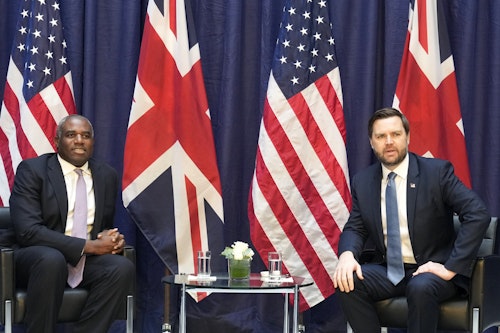
Source: AP
A rocky road to 5% of GDP for defence spending
Last year, EU defence spending reached a record €326 billion.
But Mario Draghi's competitiveness report estimates that the EU will need some €500 billion over the next decade to close the bloc's military gaps.
Currently, eight NATO members do not meet the 2% target, including Belgium, Italy and Spain.
EU leaders agreed to step up defence efforts at an informal meeting in Brussels earlier this month, but Trump called on European NATO members to increase defence spending to 5%.
"The challenge is that all these well-known problems of the European defence industry can only increase if member states will just simply increase their defence spending from 2% to 3% (which is very much needed) without significant collective European Union-level actions in the development of European Union defence," Defence Commissioner Andrius Kubilius posted on his blog before Pete Hegseth's comments.
Could recent developments with the US and Russia change this approach?
NATO DEFENCE SPENDING 2
A Flourish data visualization by Jeremy Fleming-Jones
What does Europe need, in what quantity, and by when?
Competitiveness is a critical challenge for the European defence industry, MEP Riho Terras (Estonia/EPP), vice-chairman of the Parliament's security and defence committee, told Euronews.
"It is too fragmented, internal market rules do not apply to the defence industry, and the banking sector does not lend money to defence industries," he argued, emphasising that the Commission must address these shortcomings within its mandate.
To tackle this, industry leaders are calling for an industrial output plan that translates member states' capability needs into concrete defence industry targets, specifying quantities and timelines.
Industry representatives urge governments to indicate which capabilities require scaling, by how much, and by when, both in peacetime and wartime.
In a non-paper, they stress the need for long-term procurement and investment commitments, enabling economies of scale and attracting private sector funding.
You can read the full story here.
Top defence companies in the EU by revenue
A Flourish data visualization by BRUSSELS
Kuleba: A bad deal for Ukraine is a win for Putin
Ahead of the conference, Euronews spoke to Ukraine's former Foreign Minister Dmytro Kuleba about whether Trump can achieve a just peace, Europe's role in the conflict and the potential of European peacekeeping troops, and why he believes it's too early to talk about elections in Ukraine.
What is Kuleba expecting from the Munich Security Conference?
"There are high expectations, but I don't think anything new will come from the US. The question is whether Europe will speak up," he told Euronews.
"Europe has been silent so far. It has to give its voice and express its view. Everything Trump has said and done so far contradicted not just Ukrainian but also European interests," Kuleba added.
Watch the video interview here:
A bad deal for Ukraine is a win for Putin — ex-Foreign Minister Kuleba
Euronews has spoken to former Ukrainian Foreign Minister Dmytro Kuleba about his expectations from Europe and the Munich Security Conference. #EuropeNews
Nordic-Baltic Eight warn outcome of Ukraine war will have 'long-lasting effects'
In a joint statement, the Nordic-Baltic Eight said that "the outcome of the war will have fundamental and long-lasting effects on European and transatlantic security" and that they will further boost their support for Kyiv.
The countries, which include Denmark, Estonia, Finland, Iceland, Latvia, Lithuania, Norway, and Sweden, said that their "priority now is to strengthen Ukraine" and that they will "further bolster" their support.
"We stand fully and firmly behind Ukraine. Ukraine must be able to prevail against Russia’s war of aggression, to ensure a just and lasting peace."
"We are engaging with Ukraine, the United States and all our NATO Allies and EU partners on how to achieve peace through strength. We fully commit to the sovereignty and territorial integrity of Ukraine. Ukraine should be given strong security guarantees. Ukraine and Europe must be involved in any negotiations to achieve just and lasting peace," they added.
They also said that they are "determined to further strengthen our collective security and defence, and to shoulder our responsibility for peace and security in Europe.”
Von der Leyen: US will remain the EU's 'closest ally'
The US is and will remain Europe's closest ally, EU Commission president Ursula von der Leyen told reporters in Munich.
"We want to continue working well with the United States. But we also believe that trade wars and punitive tariffs, for example, do not pay off for anyone. Tariffs are taxes. They drive inflation," she said.
Von der Leyen's comments follow Trump's announcement on Thursday that he would impose reciprocal tariffs on US trading partners on a case-by-case basis.
The 25% US tariffs on aluminium and steel will take effect on 12 March.
Folgen Sie live meiner Presseerklärung zusammen mit Markus Söder ↓ https://t.co/rX4km0YGYV
— Ursula von der Leyen (@vonderleyen) February 14, 2025
Which European leaders will attend the MSC on Friday?
The three-day conference organises panels to discuss ideas and boost debates on key topics ranging from global security challenges to democratic resilience and climate security – but which EU Commissioners are attending what?
- 14:00 > Keynote speech by EU Commission president Ursula von der Leyen, on "The EU in the World"
- 15:50 > Top EU diplomat Kaja Kallas is contributing to the "Chartering Relevance: Towards a Stronger UN in a Fragmented World" and the “Stabilizing a Restless Region. Prospects for Peace in the Middle East” panels.
- 17:30 > EU Commission’s Executive Vice President Henna Virkunnen will join a panel discussion on “Disinformation and the ‘’AI-pocalypse’ for democracies”
- 18:30 > Climate Commissioner Wopke Hoekstra will participate on a discussion called: "From ashes to Action: Climate Cooperation in a Heated World"
Macron: capitulation in Ukraine peace talks would be ‘bad news’ for all
During his election campaign, US President Donald Trump said he could end the war in Ukraine in 24 hours. Both Ukraine and the EU feared this would mean capitulation for the Ukrainians - and now those fears seem more plausible than ever.
Capitulation in the Ukrainian peace talks would be 'bad news' for everyone, said French President Emmanuel Macron.
“I don’t see that the US has a concrete plan to end the war” — Zelensky told reporters on Friday, adding that he has plans to hold diplomatic visits to the UAE, Saudi Arabia and Turkey which do not include meetings with Russia or the US.
Meanwhile, in Central Asia, where leaders have balanced their historic ties to Russia with anti-war messages, Kassym-Jomart Tokayev, the president of Kazakhstan, told Euronews that his country wants to see an end to the war.
“Ukraine remains a widely discussed topic. From the very beginning, we have advocated for an end to the war and for achieving consensus and agreement through diplomatic negotiations,” he said.
Capitulation in Ukraine peace talks would be ‘bad news’, says Macron
Other leaders such as President Tokayev of Kazakhstan have welcomed political dialogue between Washington and Moscow.
US-Ukraine meeting postponed
The meeting between President Volodymyr Zelenskyy and US Vice President JD Vance has been postponed until 5 pm because Ukraine needs to finalise the draft of the Memorandum of Partnership and hand it over to the US, the Ukrainian delegation told the Ukrainian outlet 'European Pravda'.
Meanwhile, the Russian government will not be represented at the Munich Security Conference, according to a spokesman for the Russian Foreign Ministry in Moscow.
Ukraine peace talks: Europe’s seat at the table in doubt
After Donald Trump and Vladimir Putin agreed to “immediately” start negotiations on Ukraine, Europe wonders if it will have a seat at the table. #EuropeNews
Starmer says Ukraine remains on 'irreversible path to NATO'
British Prime Minister Keir Starmer told Ukrainian President Volodymyr Zelenskyy this morning that the UK remains convinced Ukraine's place is in NATO, Downing Street said.
In a readout of a phone call held between the two leaders shared by No 10, Starmer "was unequivocal that there could be no talks about Ukraine, without Ukraine".
"Ukraine needed strong security guarantees, further lethal aid and a sovereign future," the statement went on, adding: "The Prime Minister reiterated the UK’s commitment to Ukraine being on an irreversible path to NATO, as agreed by Allies at the Washington Summit last year."
Zelenskyy, in a post shared on X, meanwhile said he informed Starmer of his "discussion with President Trump and contacts with the American side. The Ukrainian and American teams must work together with Europeans and all our global partners to achieve concrete results."
The leaders also "agreed" that with the third anniversary of the launch of Russia's full-scale attack against Ukraine fast approaching, it would be an important moment to demonstrate international unity and support for Ukraine," according to the British readout.
I had a good conversation with UK Prime Minister @Keir_Starmer. I thanked him for all the UK’s support and emphasized that we deeply value Britain’s leadership.
— Volodymyr Zelenskyy / Володимир Зеленський (@ZelenskyyUa) February 14, 2025
I informed Prime Minister Starmer about my discussion with President Trump and contacts with the American side. The…
'Million dollar question' over who in Europe should be at the Ukraine-Russia negotiations
EU leaders have insisted for months that there should be no negotiations for a peace deal on the war in Ukraine without Ukraine and Europe at the table.
But just who in Europe should be around the table has not been made clear, as Latvia's Foreign Affairs Minister, Baiba Braže, said last night.
"I think we all in Europe have been very clear, is that Europe has to be part of the negotiation process. Who is that is the next question? And that's the million dollar question, as we all know, and I won't go into it," she told the audience of a live podcast recording session in Munich entitled 'Women Global leaders' panel' from One Decision and Deutsche Welle.
"It's (about) peace in Europe, it's the interests of European countries. We in the north-east, the Poles, together with Finns and all the others, we have been, you know, in touch through all this process. You know how it is with Nordic-Baltic ministers and our conversations that are ongoing. So there is a very clear understanding. Yes, there's a role for Europe. How to do that and who's going to do that, as I said, I don't want currently to get into it," she added.
Kajsa Ollongren, the former deputy prime minister of the Netherlands, also present on the panel, expressed confidence that someone from Europe will be at the table when the time comes, as long as it remains united.
"When there's a crisis, Europe can act. We've seen it in the COVID pandemic," she said. "But it's also an example where Europe did act as one with one voice."
"I'm not worried," she went on. "We will find a way for Europe to attend. And let's first get Ukraine at the table. And Ukraine will insist on having Europe there and then we'll figure out who it has to be."
Chernobyl's attack proves 'Putin does not want peace', Zelenskyy says
“The attack on Chernobyl proves that Putin doesn’t want peace, at least under current circumstances and in this current situation. He feels ‘comfortable’ to attack Chernobyl. If he was under heavy pressure - he wouldn’t do it. He wouldn’t do it if he wanted peace and dialogue,” Zelenskyy told reporters in Munich.
Chernobyl nuclear power plant was hit by a Russian attack overnight, striking a protective shield over its destroyed fourth reactor, Ukrainian President Volodymyr Zelenskyy said.
The structure, known as the New Safe Confinement, was built through international cooperation to contain the remnants of the 1986 Chernobyl disaster. It was designed to prevent radiation leaks and safeguard the site and the broader area from environmental hazards, Sasha Vakulina reports.
Zelenskyy also said that 40 countries had contributed to the construction of the shelter over the 4th reactor. Ukraine is investigating the attack, but Zelenskyy said the Russian drone flew at a very low altitude, making it impossible for Ukraine's air defences to detect.
According to the Ukrainian president, this proves that it was a deliberate attack on the site of the world's worst nuclear tragedy.
"If the radars did not see the drone (that hit the Chernobyl nuclear power plant), they did it on purpose. It was flying low and hit the sarcophagus on the day the Munich conference began," Zelenskyy said.
Russian drone damages Chernobyl nuclear plant’s protective shield
A protective shield over the destroyed fourth reactor of the Chernobyl nuclear plant has been struck overnight by a Russian attack drone carrying a high-explos…
The situation looks rather favourable for the Kremlin, expert says
Putin’s vision of peace is a subjugated Ukraine and a weak Euro-Atlantic community, the Royal United Services Institute's International Security Director Neil Melvin told Euronews Sasha Vakulina.
“Some of the demands that Russia will make through negotiation have already been recognised, such as that Ukraine will not become a member of NATO," Melvin said.
"Although, there may be some wiggle room around that because we've had a discussion about whether Russia will want its commitment that can never join NATO, but it might be possible for what is a discussion about, well, we will revisit this in 20 years. So the question isn't completely closed off,” he explained.
Putin vision of peace is an enslaved Ukraine, expert says
Since Donald Trump announced the beginning of the peace negotiations over Russia’s war against Ukraine, the US authorities have made several statements on what…
'Stop Russia or face a global disaster', Ukrainian minister says
"Leaders gathering today in Munich face a choice: stop Russia or face a global disaster. Russia must be forced to peace through strength," Andrii Sybiha, Minister of Foreign Affairs of Ukraine, said on Friday.
Three years ago in Munich, Ukraine proposed steps to prevent a full-scale war with Russia: "But our calls fell mostly on deaf ears," Sybiha said.
"The lesson now is clear: listen to Ukraine and don’t repeat past mistakes," he added.
A Russian drone struck Chornobyl, damaging the New Safe Confinement and causing a fire at the site of one of history's worst nuclear disasters. Leaders gathering today in Munich face a choice: stop Russia or face a global disaster. Russia must be forced to peace through strength. pic.twitter.com/1i5v0PoEql
— Andrii Sybiha 🇺🇦 (@andrii_sybiha) February 14, 2025
Deal or no deal on ending Ukraine war?
Will we soon see an agreement to end the war in Ukraine? That remains the key question and pressing issue these days as US officials, Zelenskyy and EU leaders take part in discussions on global security in Munich.
On Thursday, US Vice President JD Vance told the Wall Street Journal that if Russian President Vladimir Putin does not agree to a peace deal with Ukraine that secures its long-term independence, Washington could resort to sanctions and military action.
"I think there's a deal that's going to come out of this that's going to shock a lot of people," he told the WSJ after Trump's conversation with Putin.
Our exclusive with @JDVance ahead of @MunSecConf: -On Ukraine, he says there will be a good peace deal that will guarantee the country’s long-term sovereignty - and Putin will face sanctions and military measures if he doesn’t play ball.
— Bojan Pancevski (@bopanc) February 14, 2025
-On Europe, he will tell mainstream…
Will the US withdraw troops from Europe?
On Wednesday, US Secretary of Defence Pete Hegseth somehow hinted that Europe’s security is not a priority for the US. Could this mean that Washington will withdraw troops from Europe?
For the head of the Munich Security Conference, Christoph Heusgen, it is likely.
"I suspect that today the American vice president will also announce that a large part of the American troops will be withdrawn from Europe, that Europe should take over the tasks," Heusgen told Deutschlandfunk.
MSK-Leiter: „Europa ist bereit, Herausforderungen anzupacken“
Der Leiter der Münchner Sicherheitskonferenz, Christoph Heusgen, hofft, dass von der Veranstaltung ein Signal der Stärke Europas ausgeht.
Zelenskyy expecting 'negotiations' at the Munich Security Conference
Ukrainian President Volodymyr Zelenskyy said in a post on X last night that he was "preparing for meetings and negotiations" while at the conference.
He added that he spoke to his Polish and Lithuanian counterparts, Donald Tusk and Gitanas Nauseda, to coordinate "our positions - our shared European defence".
"It is crucial that all of Europe works together and achieves common results," he added.
Fears that the US administration of President Donald Trump will side-line Europe, including Ukraine, during negotiations with Russia to end the war erupted on Wednesday after he announced that he had had a lengthy phone call with Russia's Vladimir Putin and that "their" teams would start talks "immediately".
Poland and the three Baltic nations were among the European countries that quickly and forcefully condemned the announcement.
Zelenskyy will this afternoon participate in a townhall entitled 'Strategic Investment; The Future of US-Ukraine Security Cooperation', and on Saturday morning deliver a speech on 'Defiance and Diplomacy: Prospects for Ukraine's Future'.
We are now preparing for meetings and negotiations at the Munich Security Conference. While on the way, I have already spoken with Polish Prime Minister Tusk and Lithuanian President Nausėda.
— Volodymyr Zelenskyy / Володимир Зеленський (@ZelenskyyUa) February 13, 2025
We are coordinating our positions—our shared European defense. It is crucial that all… pic.twitter.com/ZdvOaDdfOR
US JD Vance snubs Scholz in Munich
Guess who won't be having a side chat with US Vice President JD Vance?
German Chancellor Olaf Scholz, whose country is hosting the conference in the Bavarian capital from Friday to Sunday.
The two leaders met during the AI summit in Paris earlier this week - but it looks like JD Vance has run out of time for Scholz, POLITICO reports.
"We don't need to see him, he won't be chancellor long," a former US official told the news outlet of the Vance team's approach.
“We don’t need to see him, he won’t be chancellor long.”
— Hans von der Burchard (@vonderburchard) February 13, 2025
JD Vance will not meet with Olaf Scholz at the Munich Security Conference, marking a serious diplomatic rebuke to the leader of the host country amid heightened transatlantic tensions over Ukraine.https://t.co/pz7XbbMwgZ
'Perfect storm' of crises threatening EU's security
The stakes for Europe in the current multipolar world order are high.
According to the Munich Security Report 2025, the EU is facing a 'perfect storm' of crises threatening its security, economic and ideological models, which it can only weather if it increases defence spending and trade with other regions, Alice Tidey reports.
The annual report, published on Monday, argues that the EU must find ways to raise spending despite budget constraints, overcome the fragmentation of its defence industrial base and deepen cooperation with third countries, particularly Norway and the UK.
Leaders of the 27-nation bloc are currently wrestling with how to boost spending and production, with several options on the table, as estimates put the financial gap to be plugged at €500 billion over the next decade.
Read the full story on Euronews:
‘Perfect storm’ of crises threatening EU’s security, economic model
The multipolarisation of the international order is challenging the EU’s liberal vision with Donald Trump’s return to the White House likely to accelerate the…
Welcome to the MSC Liveblog!
Good morning, Europe!
This is Paula Soler, Euronews defence reporter, taking you through the first of three days of talks in Munich, where world leaders from Ukraine's President Volodymyr Zelenskyy to US Secretary of State Marco Rubio will discuss security, defence, economic models and the war in Ukraine.
You can see the full agenda here.
My colleagues Johanna Urbancik and Tamsin Paternoster will be joining you on Saturday and Sunday. Get ready for a packed agenda!











